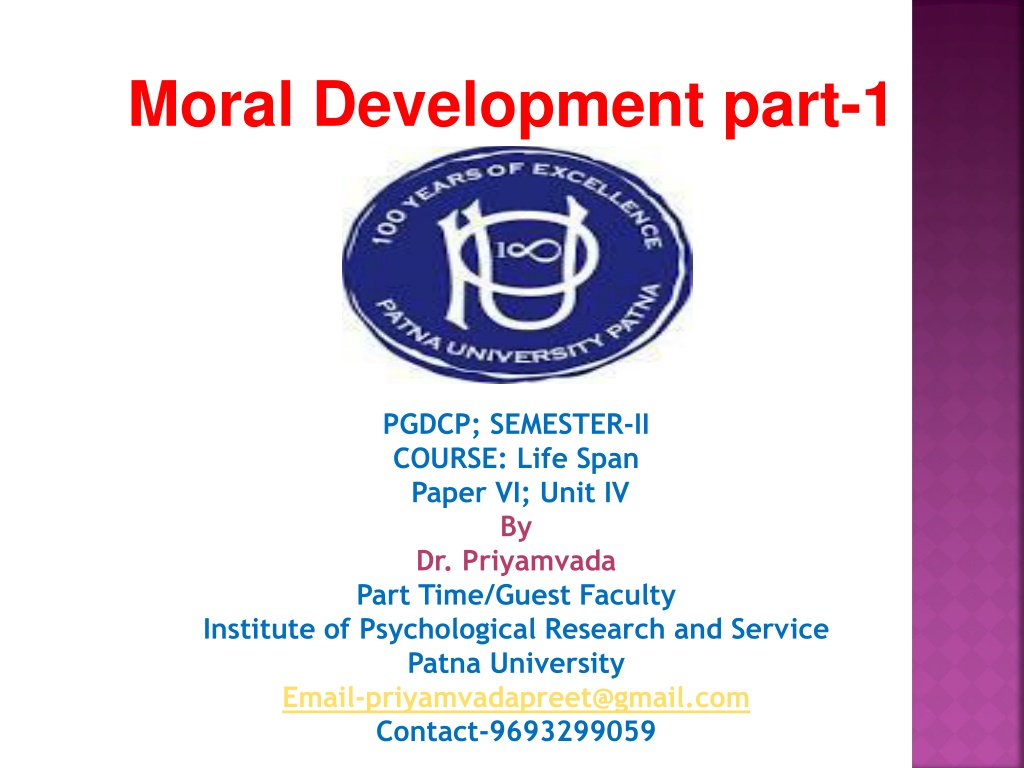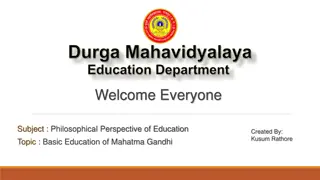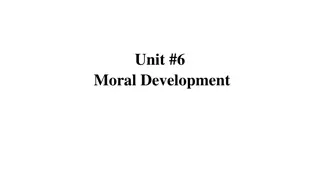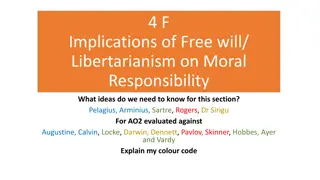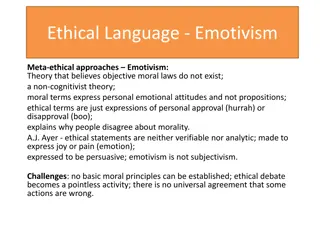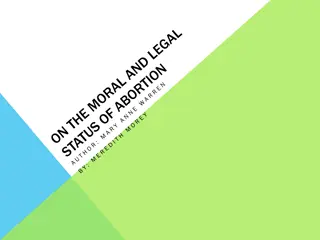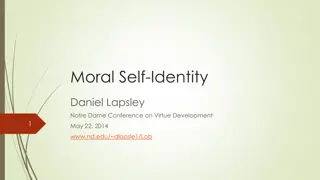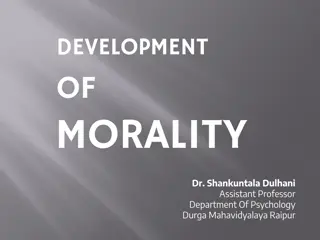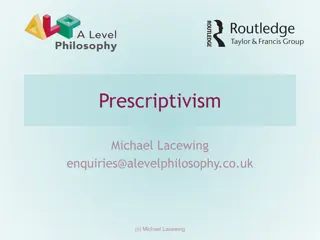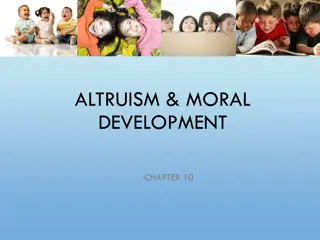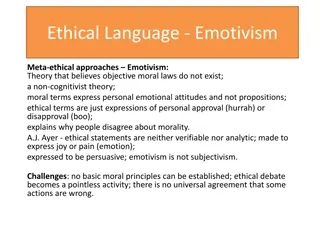Understanding Moral Development: Key Aspects and Components
Moral development is a crucial aspect of human growth that encompasses the understanding of morality from infancy to adulthood. It involves learning what is right and wrong, along with developing a sense of duty and ethical behavior. This process is influenced by various factors like beliefs, emotions, attitudes, socialization, and cultural influences. Three key components of morality include the affective aspect, cognitive aspect, and behavioral aspect, each contributing to an individual's moral understanding and development.
Download Presentation

Please find below an Image/Link to download the presentation.
The content on the website is provided AS IS for your information and personal use only. It may not be sold, licensed, or shared on other websites without obtaining consent from the author. Download presentation by click this link. If you encounter any issues during the download, it is possible that the publisher has removed the file from their server.
E N D
Presentation Transcript
Moral Development part-1 PGDCP; SEMESTER-II COURSE: Life Span Paper VI; Unit IV By Dr. Priyamvada Part Time/Guest Faculty Institute of Psychological Research and Service Patna University Email-priyamvadapreet@gmail.com Contact-9693299059
MEANING OF MORAL The term moral is derived from the Latin word mores meaning manners, customs and folk ways. Morality is indissolubly linked with the social system. The child has to learn what is good and what is bad, what is right and what is wrong. He has also to learn his duty.
WHAT IS MORAL DEVELOPMENT? Moral development focuses on the emergence, change, and understanding of morality from infancy through adulthood. Morality develops across a lifetime and is influenced by an individual's experiences and their behavior when faced with moral issues through different periods' physical and cognitive development. In short, morality concerns an individual's growing sense of what is right and wrong; it is for this reason that young children have different moral judgement and character than that of a grown adult. Morality in itself is often a synonym for "rightness" or "goodness". It refers to a certain code of conduct that is derived from one's culture, religion or personal philosophy that guides one's actions, behaviors and thoughts.
MORE ABOUT MORAL DEVELOPMENT? In order to investigate how individuals understand morality, it is essential to consider their beliefs, emotions, attitudes, and behaviors that contribute to their moral understanding. Additionally, researchers in the field of moral development consider the role of peers and parents in facilitating moral development, the role of conscience and values, socialization and cultural influences, empathy and altruism, and positive development, in order to understand what factors impact morality of an individual more completely.
THERE ARE THREE COMPONENTS OF MORALITY: 1. Moral affect the emotional component of morality, including feelings such as guilt, shame, and pride in ethical conduct. The Affective Component of Moral Development Psychoanalysts view the mature personality as having three components: An irrational id that seeks the immediate gratification of instinctual needs, a rational ego that formulates realistic plans for meeting these needs, and a moralistic superego (or conscience) that monitors the acceptability of the ego s thoughts and deeds. Freud claimed that infants and toddlers lack a superego and act on their selfish impulses unless parents control their behavior. But once the superego emerges, it was said to function as an internal censor that has the power to make a child feel proud of his virtuous conduct and guilty or shameful about committing moral transgressions. So children who are morally mature should generally resist temptation to violate moral norms in order to maintain self-esteem and avoid experiencing negative moral affects.
2. Moral reasoning The cognitive component of morality; the thinking that people display when deciding whether various acts are right or wrong. The Cognitive Component of Moral Development Cognitive developmentalists study morality by examining the development of moral reasoning that children display when deciding whether various acts are right or wrong. According to cognitive theorists, both cognitive growth and social experiences help children to develop progressively richer understandings of the meaning of rules, laws, and interpersonal obligations. As children acquire these new understandings, they are said to progress through an invariant sequence of moral stages, each of which evolves from and replaces its predecessor and represents a more advanced or mature perspective on moral issues. In this component we first examine Jean Piaget s theory of moral development and later turning to Lawrence Kohlberg s theory.
3. Moral behavior the behavioral component of morality; actions that are consistent with one s moral standards in situations in which one is tempted to violate them. The Behavioral Component of Moral Development Social-learning theorists such as Albert Bandura (1986, 1991) and Walter Mischel (1974) have been primarily interested in the behavioral component of morality what we actually do when faced with temptation. They claim that moral behaviors are learned in the same way that other social behaviors are: through the operation of reinforcement and punishment and through observational learning. They also consider moral behavior to be strongly influenced by the specific situations in which people find themselves. It is not at all surprising, they say, to see a person behave morally in one situation but transgress in another situation, or to proclaim that nothing is more important than honesty but then lie or cheat
MORAL DEVELOPMENT INCLUDES MORAL BEHAVIOUR AND MORAL CONCEPTS: 1. Moral behaviour: Moral behaviour means behaviour in conformity with the moral code of the social group. The term Moral comes from the Latin word mores meaning manners, customs and folkways. Moral behaviour not only conforms to social standards but also it is carried out voluntarily. It is always a companied by a feeling of responsibility for one s acts. It involves giving primary consideration to the welfare of the group and considering personal gain or desires as having secondary importance. 2. Moral concept: Moral concepts are the rules of behaviour to which the members of a culture become accustomed and which determine the expected behaviour patterns of all group members.
References Shaffer. David. R., and Kipp. Katherine., Developmental Psychology, Childhood and adolescence, 8th edition, Wadsworth cengage learning. Google images and Google search Thank you
